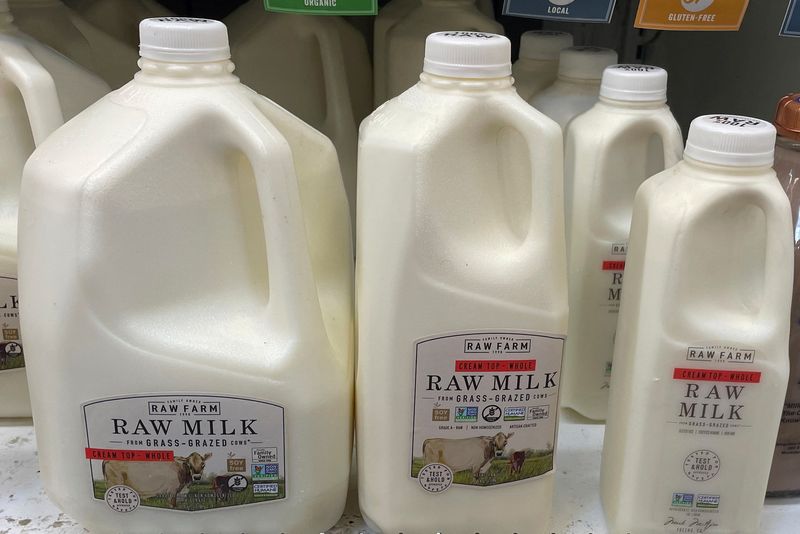By Lisa Baertlein, Julie Steenhuysen and Tom Polansek
LOS ANGELES/CHICAGO (Reuters) - U.S. sellers of raw milk appear undeterred by federal health warnings for consumers to avoid drinking unpasteurized milk in light of a bird flu outbreak that has affected dairy herds in nine states and sickened at least one dairy farm worker.
Thirty of the 50 U.S. states permit the sale of raw milk, which accounts for less than 1% percent of U.S. milk sales. A nationwide survey of pasteurized milk - heated to kill pathogens - found avian flu virus particles in about 20% of samples tested.
Many raw milk drinkers share a deep skepticism of public health officials, including the U.S. Food and Drug Administration (FDA), which also battled political polarization and misinformation during and after the COVID pandemic.
"Our consumers don't like the FDA. If the FDA says to do something, they will do the opposite," said Mark McAfee, owner of Raw Farm in Fresno, California, the largest U.S. raw milk dairy.
Federal health officials have repeated warnings for consumers to avoid raw milk, which can carry a host of illness-causing pathogens, due to the outbreak. But changing the minds of raw milk fans, who range from mothers seeking to feed their families unprocessed food to body builders on protein-heavy diets, will be an uphill climb.
Preliminary results of tests of pasteurized milk show that the process kills the virus, leaving only remnants behind. But the presence of H5N1 in milk has led many experts to warn against consuming raw milk products as they investigate whether bird flu can be transmitted by eating unpasteurized milk or cheese. And there is evidence that the virus killed a large number of cats that consumed raw milk on farms where the virus was found.
Dr. Gigi Gronvall, an immunologist at the Johns Hopkins Center for Health Security in Baltimore, said drinking raw milk is already a "crapshoot" because of the risk of diseases such as brucellosis, a bacterial infection that can be caused by drinking raw milk.
"It's even riskier now. It's just not a good practice for so many reasons," Gronvall said.
Enthusiasts have said raw milk has a creamier taste and nutritional benefits that are wiped out by pasteurization. U.S. health officials have said there is no scientific basis for the health claims.
"Our sales have never been higher," said McAfee, without providing figures.
His dairy has kept cows safe with precautions including not moving cows on or off his farm and separating any sick cows from the herd, McAfee said.
Nevertheless, products from Raw Farm and its predecessor company, Organic Pastures Dairy, have been tied to outbreaks of foodborne illness. Last year, the dairy recalled raw milk after it was linked to a Salmonella outbreak that caused illness in at least 19 people in California.
California has not reported avian flu in dairy cows.
Some former fans have stopped drinking raw milk, including Connecticut farmer Jerry Grabarek, who in 2022 abandoned his nearly 50-year habit of adding raw milk from his own cows to coffee.
"You're playing Russian roulette with a lot of things when you drink raw milk," Grabarek said.
'SMOKE AND MIRRORS'
Maryland-based raw cheese producer Sally Fallon Morell said she doubts the accuracy of the federal government's findings and believes the latest raw milk warnings are driven by worries that the product is eroding pasteurized milk sales.
"It's all smoke and mirrors," said Fallon Morell, president of the Weston A. Price Foundation, which advocates for raw milk.
Phoenix-based Sprouts Farmers (NASDAQ:SFM) Market has more than 400 grocery stores and is the largest publicly held U.S. seller of raw milk. Andronico's, which operates seven stores and is part of the Albertsons (NYSE:ACI) Companies, carries a limited assortment of raw milk local suppliers.
"We are coordinating with our suppliers and monitoring all regulatory updates," Andronico's spokeswoman Sarah Holland said.
Sprouts did not immediately respond to a request for comment.

This summer, Raw Farm will start national sales of frozen raw milk labeled for pets, McAfee said. The company's fans are already sharing social media posts about how they buy pet products to get around laws that limit raw milk sales for human consumption.
A Texas farm worker developed conjunctivitis following exposure to dairy cows - the second case of the H5N1 strain of bird flu identified in a person in the United States, following a 2022 case in Colorado.